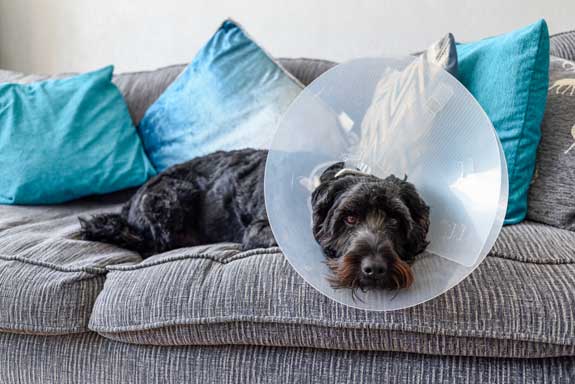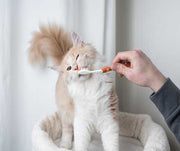Why Should I Spay or Neuter My Pet?

If you have a new pet, you may be well aware that spaying or neutering them is something you'll need to be thinking about in the near future. Alternatively, if you have an intact pet, you may be wondering if it's time for the "ol' snip snip." Whether it's something your veterinarian brought up or something you've been researching, there can be a lot of information to take in. Here, we'll cover the basics with all you need to know about spaying or neutering, the benefits, and how to best care for your pet before and after the procedure!
WHAT IS SPAYING OR NEUTERING?
Spaying and neutering is the act of surgical sterilization in animals. Spaying is the term used for females. This typically involves the removal of the ovaries, fallopian tubes, and the uterus. Neutering is the term used for males. This involves the removal of the testes. Both of these procedures remove the animal's physical parts used to reproduce as well as most of the reproduction-related instincts and behaviors. However, rest assured that it does not change their overall personality!
BENEFITS
There are many benefits to spaying or neutering your pet. Besides certain laws or even specific landlords requiring that pets be sterilized in some homes, there are many other ways that spaying and neutering is actually good for your furry friend.
The first benefits of spaying or neutering your pet is that you'll be helping to prevent overpopulation. Overpopulation of dogs and cats has become an issue across the world at large. It leaves many animals without homes and without proper care. Often, animals will end up in places like shelters where some end up having to be euthanized due to overcrowding and not enough homes available for them.
Spaying and neutering also leads to a longer lifespan and reduced risk of cancer. According to a study conducted by the University of Georgia based on over 70,000 animals, male neutered dogs had a life expectancy of 13.8% longer, and female dogs had a life expectancy of 26.3% longer. For female dogs and cats, having them spayed can also reduce their risk of breast cancer and uterine infections. For males, having them neutered reduces their risk of testicular cancer as well as developing benign prostatic hyperplasia. This, in turn, can cut unwanted costs of medical bills that come along with these health issues and also costs that come along with your pet giving birth to puppies or kittens.
Another benefit of spaying and neutering is that it will prevent unwanted behaviors in your pet. Female pets go into what is called "heat" a few days every month. This is when they are searching for mates. They may roam around, howl, or make more noise than usual, and mark their territory by spraying or urinating on different surfaces around the house. Male pets display these same behaviors, as well as attempt to mount other animals, people, or objects. Getting them neutered early enough can also prevent male pets from aggression and behavioral problems that may arise later on.
There are a few circumstances, however, where you will not want to spay or neuter your pet. One example is if you have a purebred dog that is part of a professional breeding program. Another reason would be that your pet has healthy problems that would make surgery too risky. This is something your veterinarian would determine prior to the procedure.
PREPPING YOUR PET
If you're considering having your pet spayed and neutered, pay a visit to the vet first. You'll be able to get their opinion of the best time to do it depending on your pet's age and breed, along with getting other questions answered and having them ensure that your pet is healthy enough to undergo surgery and general anesthesia.
Prior to taking them to their procedure, you'll want to be sure they don't eat after midnight the night before. Be sure to check with you vet, though, to get specific instructions for your pet and any additional information you'll need to prepare them.
AFTERCARE

When it comes to recovery, be sure that your pet has a comfortable place to relax. If you have other animals in the home, you'll want to keep them in a separate space so that they don't accidentally injure your pet as he or she is on the mend.
Sometimes, pain medications may be prescribed to your pet. If so, follow your vet's instructions and stay on top of giving your pet the medications so that he or she can stay as comfortable and pain-free as possible.
Your vet may recommend waiting a specific amount of time before taking your dog on walks or runs, so be sure you take note of this and don't force your pet to exercise before he or she is ready.
You'll also want to check the incision site daily to be sure that it's healing properly. Your pet may be tempted to lick it, which could lead to infection, so it might be a good idea to use a cone collar to prevent them from reaching this area.
If you notice any signs of swelling, discharge, redness, or if your pet is displaying signs of illness after the surgery, check in with your vet.
CONCLUSION
Hopefully this has been a helpful overview and answered any initial questions you had regarding spaying or neutering! As always, be sure you seek professional advice from your veterinarian before planning this procedure for your furry friend.
Sources:
Previous article

Next article

Related posts
View all-

Keep Your Pets Safe During the Holidays
The holiday season brings joy, festivities, and a break from the usual routine. While you're enjoying the celebrations, it's important to remember that the holidays can present unique challenges for our furry family members. The new sights, sounds, and people can be overwhelming, and common festive items can pose unexpected risks.
Read Article -

Holiday Gifts for Every Pet Personality: The Ultimate Guide
The holiday season is finally here, and for many of us, that means finding the perfect presents for the ones we love most—our pets. Whether they are a steadfast dog who never leaves your side or an independent cat who graces you with their presence on their own terms, our pets are cherished members of the family. They deserve to celebrate right alongside us, stocking stuffers and all.
Read Article -

How to Keep Your Pet Calm During Thanksgiving
Thanksgiving is a time for family, friends, and food, but for our pets, the holiday can be overwhelming. The sudden change in routine, unfamiliar faces and scents, and increased noise can trigger significant stress. Understanding why your pet might feel anxious is the first step toward creating a peaceful holiday experience for everyone, including your furry family members. This guide offers calming tips for pets and practical solutions to ensure your dog or cat feels safe and secure during the festivities.
Read Article



